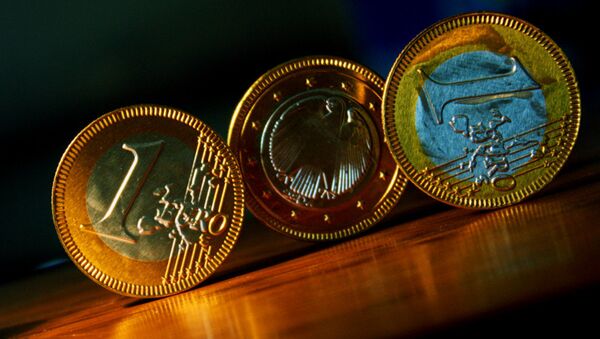MOSCOW (Sputnik), Daria Chernyshova — Any trouble in the interconnected global economy could have a knock-on effect on the weak eurozone, potentially turning catastrophic for the European single currency, experts told Sputnik Tuesday.
On Monday, European stock markets posted their worst day’s performance since the 2008 crisis, with indexes closing down 4-7 percent after the recent turbulence in the Chinese equities and Asian markets. Although Europe’s stock markets regained some ground on Tuesday, the eurozone appears very vulnerable to shake-ups in global economy.
The eurozone, which has been in recession since the global financial crisis of 2008, and only recently started to show the signs of recovery, is not ready to absorb the shocks inherent in the integrated global economy, Robert Oulds, director with The Bruges Group told Sputnik.
“The eurozone still has fundamental economic problems, it has very little capacity to absorb any shocks that might happen to the global economy, such as one which is happening right at this moment – crush of shares in China which is affecting other countries, it is already spreading around the world,” Oulds said.
He stressed that the eurozone is currently in a situation where “any problem hitting the eurozone would be a catastrophe.”
A crisis in one economy would mean less trade, less fiscal transfers, less economic growth, and less confidence spilling over into other economies, he added.
Lawrence White, Professor of Economics with New York University, said that unlike the United States, Europe is more involved in international trade and sell larger volumes to China.
“So it would be natural that there would be more concern in Europe that the slowdown in China is going to have more consequences of a slowing down in Europe,” White said.
He stressed that beyond the effect of China’s slowdown, the eurozone is witnessing so-called common problems – “given the fixed exchange rate that the euro applies to all of these countries, some countries are going to have greater problems than other, that is something the eurozone has had to deal with for six years.”
The European Central Bank (ECB) has introduced several measures to boost economic growth. The most recent being the quantitative easing announced by ECB President Mario Draghi in March.
Oulds said the so-called Draghi bazooka did not create the growth that was expected of it, leaving governments across the eurozone devoid of the tools needed to support the economy.
“The governments are so indebted that the they have very little room for manoeuvre, for fiscal action to alleviate any problems,” Oulds said, stressing that given the austerity measures implemented in the eurozone economies, any fiscal action becomes even more difficult.
He stressed that it is not just in the eurozone that central banks are running out of ammunition, that this is a trend that can be observed around the world, which means that the economies are even more susceptible to all sorts of economic shocks.
“Ultimately the problem is the eurozone, and they need to have their own currencies, their own central banks, they need to use these central banks to inject economic growth into their countries, that is actually the only way forward,” Oulds said.
Lawrence White pointed to another problem facing the eurozone — the difficulty in implementing unified policies in a multinational block, because “the eurozone is still a confederation of sovereign states rather than a unified country,” making it harder for them to mobilize economic tools.
He noted that the ECB has become a tool for dealing with economic problems, adopting the attitude that it “will take any actions to make sure that the eurozone stays a coherent collection of countries,” White added.
SHORT-TERM FORECAST
In the short term, the experts do not predict any growth in the eurozone and expect it to remain vulnerable to any loss of investor confidence.
“I think there would be growing unemployment within parts of the European Union, there would certainly not be major steps forward, any loss of confidence will shake investors. There would be further stagnation in the eurozone which is very bad when the rest of the world is moving forward,” Oulds told Sputnik.
White said he is more optimistic about the US economy, because the eurozone is far more exposed to the troubles in other parts of the global economy, while the United States have more tools at their disposal and are currently experiencing a burst in productivity.
“The eurozone has entered a period of slower growth and my guess is that it will continue. The slowing down growth in China, that had consequences elsewhere in Asia, and Japan is still not a robust country, so all of that has consequences for Europe, which means it will continue to be a not robust area,” White noted.
In late July, the International Monetary Fund (IMF) announced that the euro currency zone would grow by an estimated 1.6 percent a year in the medium term. The IMF warned that eurozone growth prospects were below what is needed to reduce unemployment to acceptable levels, opening the region's economy up to negative shocks and extended low growth.



